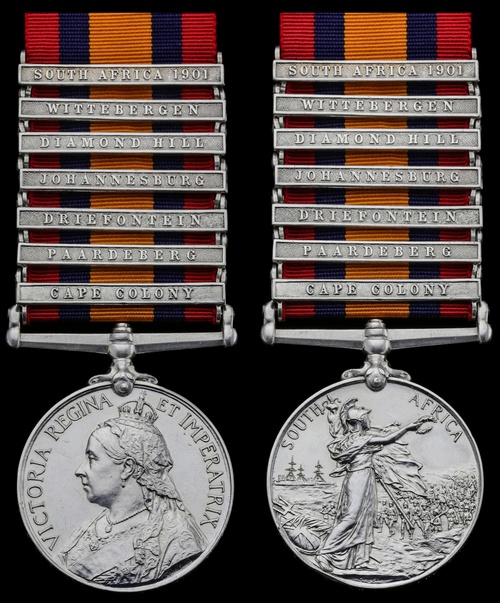
Auction: 20001 - Orders, Decorations and Medals - conducted behind closed doors
Lot: 192
Queen's South Africa 1899-1902, 7 clasps, Cape Colony, Paardeberg, Driefontein, Johannesburg, Diamond Hill, Wittebergen, South Africa 1901 (68776 Gnr: G. Borham. 82nd. Bty: R.F.A.), extremely fine
George Borham was born around 1869 at Notting Hill, London, and attested for the Royal Artillery at Colchester on 20 September 1888. A farrier by occupation, he stated previous service with the 3rd Battalion, Middlesex Regiment. Sent to India from 12 February 1890-1 February 1896, he served as a Gunner during the Boer War in South Africa from 1 January 1900-20 August 1901, his papers confirming clasp entitlement and noting 'exemplary' service.
Discharged on 6 November 1906, Borham returned to his wife Annie and took employment as a charcoal burner and house-porter, living at 33 Bulow Road, Fulham. It wasn't long before Borham fell upon hard times, likely associated with raising three sons. The Leominster News, 5 July 1907, describes the circumstances:
'Jewels buried in Kew Gardens: Sequel to a Burglary at Kensington.
The robbery of £400 worth of jewellery from the residence of Mr. Henry Salmon, 27, Holland Villas Road, Kensington, on June 14th, has had an unusual sequel.
On Thursday, George Borham, aged 39, a discharged soldier, who had been employed once a week as a window cleaner at Mr. Salmon's house, was charged at West London Police Court with the theft. He then informed the police that he had hidden the property and offered to disclose the place. That he might do so, the magistrate allowed the accused out on his own recognisances.
On Friday, Borham led Detective-Inspector Fuller to Kew Gardens, and indicated a large oak tree in a remote part of the grounds. Here the officer did some digging, and found most of the jewels - a diamond ring, brooches, necklets, bracelets - wrapped in a newspaper. The prisoner said he pawned some of the jewels, and with the money went to Ascot and Brighton and Southampton; the remainder, being the largest jewels, he buried.
The accused was committed for trial.'
In April 1915, having become father to two further children, Borham returned to service with the Royal Field Artillery. Suffering from ill-health, he was posted to the 31st Battery and worked as a Storeman at the Maryhill Barracks in Glasgow. On 18 July 1917 his condition deteriorated significantly, a medical report citing difficulty breathing, likely attributed to malaria contracted in India in the early 1890's. This was compounded by problems with his heart which resulted in Borham being discharged physically unfit five days later. He died not long thereafter on 17 October 1917, his youngest daughter being just 3 years of age; sold with copied service record and newspaper articles.
Subject to 20% VAT on Buyer’s Premium. For more information please view Terms and Conditions for Buyers.
Sold for
£480
Starting price
£110




